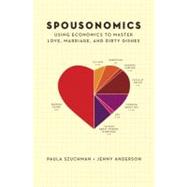
Note: Supplemental materials are not guaranteed with Rental or Used book purchases.
Purchase Benefits
What is included with this book?
| Introduction | p. ix |
| Division of Labor | p. 3 |
| Or, Why You Should Do the Dishes | |
| Loss Aversion | p. 36 |
| Or, The Upside of Going to Bed Angry | |
| Supply and Demand | p. 69 |
| Or, How to Have More Sex | |
| Moral Hazard | p. 98 |
| Or, The Too-Big-to-Fail Marriage | |
| Incentives | p. 130 |
| Or, Getting Your Spouse to Do What You Want | |
| Trade-Offs | p. 159 |
| Or, The Art of Getting Over It | |
| Asymmetric Information | p. 188 |
| Or, Why You Should Tell Your Partner Stuff | p. 188 |
| Intertemporal Choice | p. 215 |
| Or, Being a Good Person ... When You Get Around to It | p. 215 |
| Bubbles | p. 241 |
| Or, Making the Good Times Last | |
| Game Theory | p. 277 |
| Or, How Strategizing Like Khrushchev and Manipulating Like Kennedy Can Make for a Blissful Marriage | |
| Acknowledgments | p. 305 |
| Notes | p. 309 |
| Image Credits | p. 319 |
| Index | p. 321 |
| Table of Contents provided by Ingram. All Rights Reserved. |
The New copy of this book will include any supplemental materials advertised. Please check the title of the book to determine if it should include any access cards, study guides, lab manuals, CDs, etc.
The Used, Rental and eBook copies of this book are not guaranteed to include any supplemental materials. Typically, only the book itself is included. This is true even if the title states it includes any access cards, study guides, lab manuals, CDs, etc.